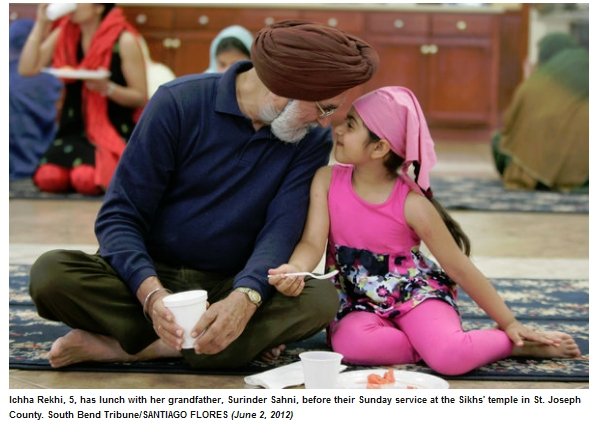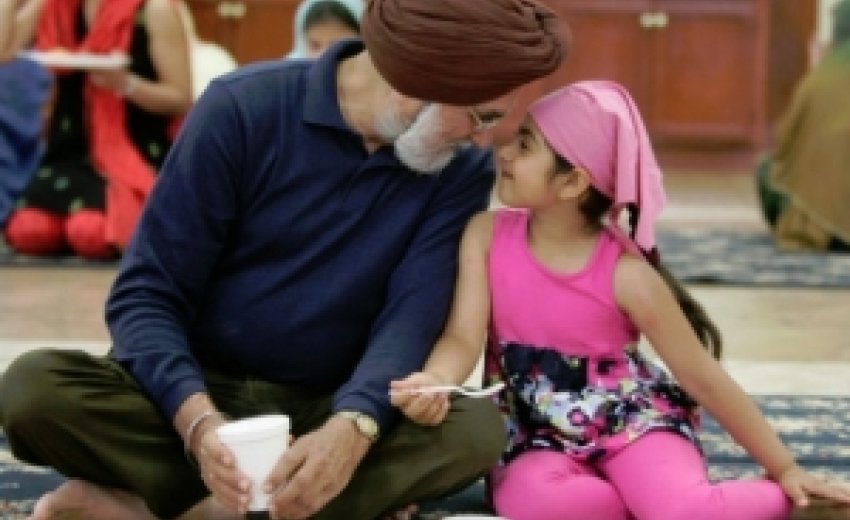
MISHAWAKA -- In this place of worship, the men sit on the floor along one side, with their uncut hair placed in turbans or their heads otherwise covered.
Sitting on the other side are the women, their heads also covered, their feet bare.
Someone waves a "chaur sahib" -- yellowish yak hair gathered into a handle -- over the "granth," a book containing the writings of 10 gurus.
Spiritual messages are sung to the music of a harmonium and drums, with slides interpreting the words in Gurmukhi, an Indian language, and English.
It might look and sound a bit different from the Sunday services in other houses of worship, but in the "gurudwara" of the Sikh Culture Society of Indiana, the overriding belief is common to many; the first line in the holy book compiled by the 10 gurus is translated, "There is but one God."
The gurudwara, which was built six years ago at 12800 Day Road, has grown to about 60 families, attracting about 150 on a given Sunday, says Tina Rekhi, who grew up in Punjabi, India, and moved here in 1998 with her husband, Gurvinder Singh Rekhi.
The group became the most recent member of the United Religious Community last year because, Tina Rekhi says, "A lot of people don't know about the Sikh faith, so this was a good way to teach people."
What Sikhs believe
The Rekhis, head granthi Amarjeet Singh and Surinder Singh Sahni explained the religion and its practice one recent afternoon.
"It's a very, very practical faith," Tina Rekhi says.
Sikhism, now said to be the fifth-largest in the world in terms of the number of followers, originated in Punjab, India, in 1469, differentiating itself from India's more dominant religions: Islam and the caste system of Hinduism. Sikhs believe in the co-existence of other religions.
In fact, the ninth guru of Sikhism was tortured and killed by Mughals to protect the rights of Hindus to practice their own religion rather than be forced to convert to Islam.
Sikhism was one of the first religions to treat women equally, they say. The practice of serving everyone vegan food after a service -- prepared without measuring and blessed during the service -- is a measure of that.
"Whether you're a pauper, whether you're a king," Tina Rekhi says, "we all sit and eat at the same time."
Most commonly, people confuse Sikhs with Arabs. The first person killed in a hate crime after 9/11 was a Sikh mistaken for a terrorist.
Questioned in airports and regarded strangely, they say they deal with misunderstandings but have learned that they need to teach others about their faith.
Sikhs believe in reincarnation. By the time you live your human life -- living it well being the only way to pray and to find salvation, to be united with God -- you will have already lived 8.4 million other lives, in other forms, they believe.
Indians are exposed to many religions in their country, and they also celebrate Christmas.
They believe in cremation, community service, honest labor and in "amrit," the Sikh baptism. After baptism, Tina Rekhi explains, it is even more likely that a Sikh will exhibit the five "K"s that identify them:
Kesh: Not cutting hair is symbolic of treating your body as it was made. Beards are long or tucked neatly into shorter beards.
Kanga: a wooden comb, to keep your hair groomed
Kara: a steel bracelet on the right wrist
Kachhahra: special shorts much like boxers, even for women
Kirpan: a short, now blunt sword; the U.S. government has only recently allowed these into public buildings.
Singh, which means lion, and Kaur, which means princess, are given as middle or last names to Sikh men and women, especially after baptism. In Sikhism, these titles eliminate discrimination based on "family name" (which denotes a specific caste) and reinforces that all humans are sovereigns and equal under God.
Finding a home
Sitting in the kitchen area are many golden domes, which will be installed on the building's roof in a few months. Granite markers identifying the faith are to be placed outside.
It's not there now, but a sign out front identified the Sikh symbols of a double-edged sword and a circle of eternity -- "So we're saints and soldiers," Gurvinder Rekhi says -- and it caught the eye of Amy Peterson.
Peterson was born in India, but the Elkhart mother of two has lived an Americanized life for most of her 50 years, after her parents moved the family to California when she was 9.
Finding the congregation of Sikhs, her first religion, was like coming home.
The language is slowly starting to come back to her, she says.
Peterson married her husband, Denny, who's from Dowagiac, 23 years ago, and the family faithfully attends Granger Community Church.
"I found it at the right time," she says. She happened to drive by and spotted the sign on Day Road last year -- a tough year in which her sister and her mother-in-law died a week apart.
The rest of her family will come and learn, too, she says. But for now, she's taking it all in.
"It's someplace," she says, "we can find peace."
